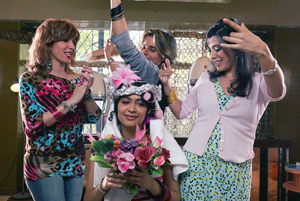By Borzou Daragahi
 Los Angeles Times / February 5, 2008 BEIRUT – In a nation shaken by war, divided by religious strife, and paralyzed by political feuds, Lebanese actor-director Nadine Labaki found the perfect subject for her first film: a hair salon filled with chatty women obsessed with sex and looks.more stories like this "Caramel," the 33-year-old Labaki’s bittersweet film of love, heartache, and friendship, has quickly become one of the most successful Lebanese films ever, scooping up awards, breaking sales records, and earning kudos on the international film circuit. It will begin showing in US art houses Friday, including at Kendall Square in Cambridge.
Los Angeles Times / February 5, 2008 BEIRUT – In a nation shaken by war, divided by religious strife, and paralyzed by political feuds, Lebanese actor-director Nadine Labaki found the perfect subject for her first film: a hair salon filled with chatty women obsessed with sex and looks.more stories like this "Caramel," the 33-year-old Labaki’s bittersweet film of love, heartache, and friendship, has quickly become one of the most successful Lebanese films ever, scooping up awards, breaking sales records, and earning kudos on the international film circuit. It will begin showing in US art houses Friday, including at Kendall Square in Cambridge.
"It was not easy because I made a film that was talking about life and colors and people and love and everyday life when my country was at war again," Labaki said during a recent chat over mint-flavored lemonades at an old-fashioned cafe on Beirut’s Gemayzee Street. "I think I dealt with it, and I understood that maybe that’s the way it was supposed to be; that it’s my mission to show a Lebanon that has nothing to do with war and this negative image that people have."
"Caramel" follows a group of women, mostly played by amateur actors, whose lives revolve around a Beirut hair salon. Layale, played by Labaki, is tangled in a steamy romance with a married man. Shiite Muslim Nisrine reveals to co-workers that she’s not a virgin, a fact that could complicate her upcoming marriage. Rima, a lesbian, falls in love with one of her glamorous clients. Middle-aged Jamale struggles to maintain her acting career while Rose must decide between pursuing an autumn romance or caring for her deranged sister Lili.
The film feels heavily influenced in subject matter and aesthetics by Pedro Almodovar’s films. The women wear revealing, brightly colored clothes that could surprise US viewers unfamiliar with Lebanon’s tolerant culture. But to most American audiences, "Caramel" might come off as a typical chick flick.
Still, the 2007 French-Lebanese co-production has surprised Middle East audiences used to inane slapstick comedies, unoriginal action flicks, or poorly scripted melodramas. "Caramel" immediately struck a chord with moviegoers in the Arab world, where it continues to play in theaters. It has sold more than 120,000 tickets in Lebanon and half a million in France, which considers itself a patron of Lebanese culture.
"It’s very touching and very natural," wrote Oriental Arabesques, a blogger in her 30s in the United Arab Emirates. "The movie simply portrays life in any Arabic capital or city, with all its contradictions, with all its happy and sad moments."
Labaki took an unusual route to the film world. As a child in the Christian mountain region north of Beirut she watched movies while sheltered from the ongoing civil war. She mentions "Snow White and the Seven Dwarfs" and "Grease" as inspirations
She made a name for herself in the Middle East directing television commercials and video clips. One video in particular, a clip promoting Lebanese pop diva Nancy Ajram’s song "I Will Upset You, Yes," raised eyebrows in the Arab world and established Labaki as an artist to be reckoned with.
In the video, Ajram wears a strapless black dress and dances carefree in front of more than 100 gawking men at a traditional Arab coffeehouse. She sits down and laughs gleefully as she plays cards with and teases the hapless men.
"She was not scared of them," says Labaki. "It played on the image of Arab women to create examples of women that are free with their bodies, with their movements, do whatever they want to."
From early on, Labaki narrowed in on themes of privacy and sexuality. Her first short movie, "11 Pasteur Street," followed an apparent sniper looking through the scope of his weapon. After a while it becomes clear that he’s not out to kill anyone; he’s just spying on and deriding neighbors with whom he’s all too familiar. His weapon becomes a metaphor for the potentially hurtful glares of relatives, neighbors, and strangers within the closely woven web of Middle East social life.
The idea for "Caramel" came to her gradually as she began to notice that all the women around her were unhappy.
"Lebanese women seem like they’re very modern and model women for the whole Arab world, but I don’t think it’s really true," she explains. "I don’t think we are as free as we think we are. We are not very happy, not very comfortable with our bodies."
The run-down hair salon of "Caramel" is a space where women can honestly share their insecurities, shame, and joys. While preening, plucking, and pulling hair, the stylists and their customers develop intimacy, unable to hide one another’s warts and imperfections.
It’s also a place where taboos are daily broken. The story line is particularly novel for a conservative Arab audience but elicited little negative reaction, either in Lebanon or the rest of the Arab world.
"I’m not provoking anyone," Labaki says. "I’m not giving anyone a lesson. I’m not saying this is right or wrong. I’m just showing the reality, very softly, the way it is, and it’s up to the people to make their own interpretation or conclusion."![]()



